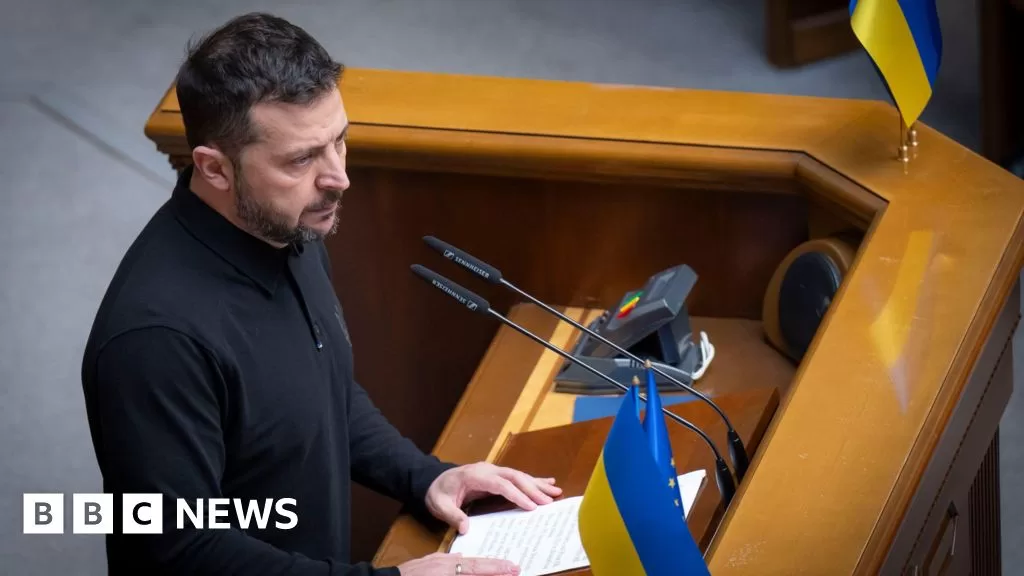Ukrainian President Volodymyr Zelensky has presented MPs with a long-awaited “victory plan” that aims to strengthen his country’s position enough to end the war with Russia.
Zelensky told parliament in Kyiv the plan could finish the war – which began with Russia’s full-scale invasion of Ukraine in February 2022 – next year.
Key elements include a formal invitation to join Nato, the lifting by allies of bans on long-range strikes with Western-supplied weapons deep into Russia, a refusal to trade Ukraine’s territories and sovereignty, and the continuation of the incursion into Russia’s western Kursk region.
The Kremlin dismissed the plan with a spokesman saying Kyiv needed to “sober up”.
Addressing MPs on Wednesday, Zelensky also criticised China, Iran and North Korea for their backing of Russia, and described them as a “coalition of criminals”.
He also said that Russian President Vladimir Putin had “gone mad”, describing him as bent on waging wars.
Zelenksky said he would present the victory plan at an EU summit on Thursday.
“We are at war with Russia on the battlefield, in international relations, in the economy, in the information sphere, and in people’s hearts,” he told parliament.
The plan outlined by Zelensky consists of five key points:
- Inviting Ukraine to join the Nato military alliance
- The strengthening of Ukrainian defence against Russian forces, including getting permission from allies to use their long-range weapons on Russian territory, and the continuation of Ukraine’s military operations on Russian territory to avoid creation of the “buffer zones” in Ukraine
- Containment of Russia via a non-nuclear strategic deterrent package deployed on Ukrainian soil
- Joint protection by the US and the EU of Ukraine’s critical natural resources and joint use of their economic potential
- For the post-war period only: replacing some US troops stationed across Europe with Ukrainian soldiers
Three “addendums” remain secret and will only be shared with Ukraine’s partners, Zelensky said.
In the Ukrainian capital, Kyiv, residents who spoke to the BBC were mostly supportive of the plan.
“We should not give up territory,” one man said, adding that he hoped Ukraine would still have a chance to join Nato and would also get more support from its allies.
A woman said everything depended on what security guarantees Ukraine would be able to get.
Another woman stressed that “people want to end the war as soon as possible”.
Zelensky’s plan was presented to US President Joe Biden, as well as presidential candidates Kamala Harris and Donald Trump, back in September.
Key allies such as Britain, France, Italy and Germany have also reportedly been shown the plan.
On Wednesday evening, Zelensky spoke to Biden to brief him about his “victory plan”.
He also thanked America for a new $425m (£327m) defence assistance package for Ukraine, which included air defence systems and long-range weapons.
The White House said the package comprised “a range of additional capabilities”, including air defence and artillery systems, as well as ammunition and hundreds of armoured vehicles.
It said of Zelensky’s “victory plan” that “the two leaders tasked their teams to engage in further consultations on next steps”.
Last month, US officials were quoted by the Wall Street Journal as saying that the Biden administration was concerned that the plan lacked a comprehensive strategy, and was little more than a repackaged request for more weapons and the lifting of restrictions on the use of long-range missiles.
Analysts both in Ukraine and the West have also suggested that the White House is keen to show that it wants to avoid further escalation with Russia in the run-up to the US presidential election.
Zelensky’s conditions for peace are increasingly at odds with the situation which surrounds him.
In front of MPs he acknowledged the growing fatigue in his country. His own tiredness was etched across his face as he said that “victory has become for some an uncomfortable word and it’s not easy to achieve.”
National morale has gradually been crumbling under the weight of a mounting death toll, a controversial mobilisation law and never-ending Russian assaults on Ukrainian territory.
It’s increasingly thought any peace deal would have to involve Ukraine conceding territory in exchange for security guarantees.
However, there was no hint of a compromise to bring the end of the war closer. Instead, Zelensky doubled down on wanting to force Russia to negotiate and to not cede Ukraine’s territory, through the strengthening of his own military.
He also claimed his extensive plan could be implemented with the agreement of his allies, and not Russia.
In public, Zelensky evidently still sees this war as existential, and warned of Russian President Vladimir Putin continuing to strengthen his position.
He also seemed to frame his vision as an investment opportunity for Western allies in terms of natural resources and economic potential.
The Ukrainian president wants his exhausted troops to keep fighting.
But with his army so reliant on Western aid, his “victory plan” will need the approval of the next US president.
Reacting to Zelensky’s plan, Nato’s new Secretary General Mark Rutte described it as a “strong signal” from Kyiv.
“That doesn’t mean that I here can say I support the whole plan – that would be a bit difficult because there are many issues that we have to understand better.”
Mr Rutte added: “I am absolutely confident that in the future, Ukraine will join us [Nato].”
Immediately after Zelensky finished speaking, the Kremlin rubbished his “ephemeral peace plan,” saying Kyiv needed to “sober up”.
The only way the war would end was Ukraine to “realise the futility of the policy it is pursuing,” Kremlin spokesman Dmitry Peskov said.
